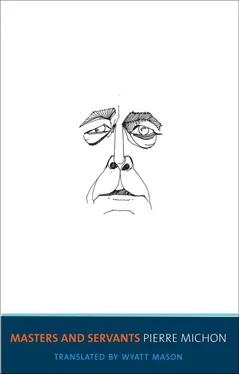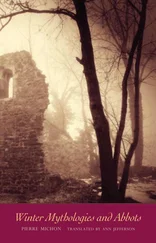I told him this; he laughed, offered me sarcasm in reward for my great insight, and then went on muttering to himself. While painting, he spoke little but cursed often; wore neither wig nor hat, but a nightshirt that seemed out of place; wiped his brushes on his stockings; I should also add his bafflement, his thinness; in a word, he looked like a painter, the way most people imagine painters to look, as I imagine them myself: vain and true, full of pretension and seriousness, and maybe the pretension really is seriousness, that only this pretension can convince them they are painters, only it can make them paint, pastorals or masterpieces, farces or Apparitions; they too must see themselves as coin of the realm. And mine was far from an exception to this rule.
No matter. Now he’s dead, the little charlatan: he’s not minting much of anything, even if some flirt swoons in front of his fine draperies or laughs at my sad face in the café that the actor Belloni opened, where anyone, they tell me, can now see it. Was it for this that he had worked so hard? All this industry, to seduce whom? He could afford to have his air of astonishment, to fight with nothing like some Quixote, to throw his colors, brilliant or muddy, into the air, onto his stockings, his furniture, and in the end to stop suddenly as he often would before one of the paintings underway, baffled. I don’t want to describe him at work very much; just know that he skimmed across the canvas with brusque little strokes; little movements; that there wasn’t a part of him that didn’t participate in this nothingness; that the sweeping whirl of his whole arm, his whole leg, released violently with relish like a whip, always tapered to a furtive little touch, an exasperated caress, as if stymied: hovering in the air above the canvas, he would muster a despotic paraph that would somehow become a trembling little cross; he would wind up for a tremendous slap in the face and leave nothing more than a beauty spot on the cheek of a Columbine: all of this troubled him deeply, drained him. I imagined that all painters were like this. It wasn’t until later I learned from his lips that this little touch, like fencing, wasn’t so common and gave him the distinction of being classed by his colleagues amongst those they call, in the jargon of the craft, les petits toucheurs .
So was this Pierrot hurried forth. At the end of the second morning, the painter turned his back to me and stood looking out a window. I looked at the thing. I saw something like a man from the Eighth Day — God, exhausted, having forgotten man had already been created the day before, and for this one there wasn’t another Eve in the wings; I recognized my dull face in those features; and I recognized his by its stupor, and more so the surprise, the resignation of someone who had painted for nothing, again; the face of anyone and no one when we think no one is watching. It didn’t speak, it was either a ghost or an idiot, all white, with huge, manly hands; in the background, Italian poplars and pines, a scarlet stooge busy doing something and ardent summer mists, all blue: some other summer, doubtless long ago. On the grounds, the winter wind whistled in white gusts. He watched the wind.
I DON’T RECALL IF THERE WERE any women in that painting; it didn’t seem to me there were any in his life that winter — although one of the servants fat Crozat or Monsieur de Jullienne had left him was pretty and sly, a bit more affected than one might wish. So it was to distract him that I dragged him along on walks to the frozen carp ponds, even though it was hard for him to keep up with me, not having a real taste for wilderness or nature, and for long walks even less; perhaps it was to distract him that I told him about my life, while he kept his pretty much to himself; some have said he was taciturn and it is true that he was; but he talked — about fat Crozat, or handsome Jullienne and his little silver knickknacks, his brocaded vests, his ties, about his masters or about the little people of Nogent who raise rabbits and chickens, who gossip and die — he was a little rogue, alert and kind, mordant, mimicking them all artfully and sparing no one. A buffoon, but a ghostly buffoon nonetheless; because what he taunted most and what he made seem the most unreal of all was himself: he, Monseigneur le Peintre , before whose shadow he pretended to doff his hat, affecting a Picard accent and opening his eyes wide like a Jacques de la farce . It was again to offer him some distraction that I invited Agnès and Elisabeth, the daughter and niece of one of my bourgeois friends, both of whom were often overcome by fits of giggling, love letters, and feigned melancholy, overcome above all by the pursuit of someone they could love, innocent but ignorant, milky, cousins. This was to offer him some distraction, but my heart isn’t so pure: it was also to tempt him.
He was working on a large composition that had been commissioned by the Academy or some dealer, I don’t know which anymore; I don’t remember the painting very well: all I can see is a high forest and white clouds collapsing though it, through a sizeable break he had opened with his brushes and filled with clouds all white, all the way to a little temple vaguely like the one where he was painting, but ghostly and reflected in the water; women stood paused before this break in the woods, as usual. The countryside had already been painted, the figures were only sketches; he reluctantly asked if Agnès and Elisabeth would like to be these women — he seemed annoyed that they were there, was perhaps politely exasperated, and he couldn’t keep his eyes off them. Of course the two girls couldn’t keep quiet, were blushing and sneaking glances at each other, but not saying no; he had some elegant outfits and few that were ridiculous in which he costumed his models as it suited them; he went through an armoire and came back with armfuls of crackling silks, pink and blue satins, ball gowns and corsages. They found themselves suddenly marquises, they clapped their hands. They got dolled up in the next room, still giggling. We didn’t look at each other. He arranged them as he saw fit; they were seduced; I believe the painter by whom they had initially been intimidated didn’t take very long to disappear from memory, making way for someone less distant, for sweeter secrets, for a tailor ready to serve them, consumed with draping their little bodies in silks, or for a hairdresser who trussed up their tresses and placed a feather atop the trembling mass, revealing their ears and their necks, their cheeks appearing fuller and their necks nearer, as expected. He did some rapid sketches, standing, crouching, sitting; almost always from behind; they lent themselves to this mise-en-scène with an affected good grace. He, disgusted, sketched in three colors as if these delicate hands were just some landscape, these little shod feet.
A landscape, really? He was very nearly trembling; it wasn’t from the breeze and he knew it. He was more serious than ever, too serious. They were taking his breath away; in the presence of these little, eerily costumed hearts, aglow at being seen and at being at his mercy, he became someone else, his taste for farce disappeared, he lacked every word: all that remained was an intense reserve that seemed comic to me, a sort of total bodily embarrassment, a stiffness in his spine and his arms that left only his right hand free, unfettered, prodigiously free, and as brusque as ever, as distorted, stroking thick and fast. He seemed watchful, but you couldn’t tell whether he was exulting in having his prey within reach or conjuring it in vain. He paid as much attention to me at this point as he did to the furniture; I had disappeared; he only spoke to one or the other, in few words and rather rudely, to have them adjust their posture, to look at him or bend their necks away: they were praying, I think, that the way he was acting was only the terseness of a fine artisan, while it was really the exasperated, hidden sigh of a famished ogre sharpening his knives under the table — but of this I wasn’t certain until much later, and neither were they.
Читать дальше












